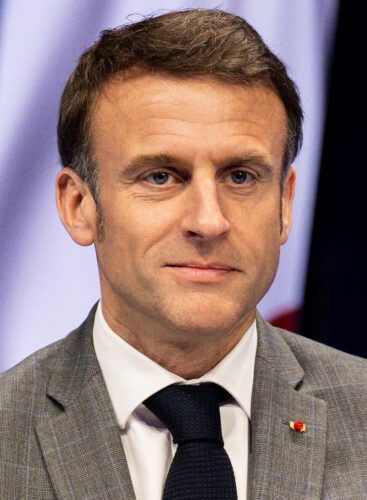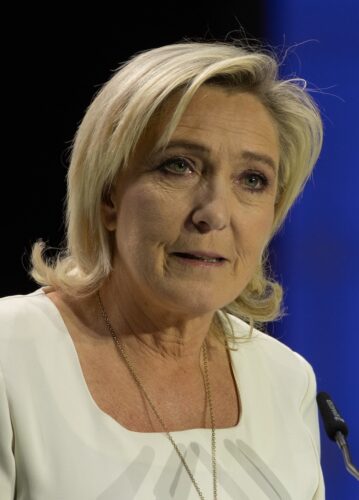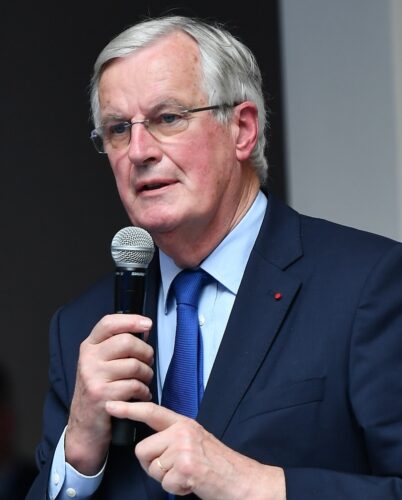
How the Youngest Ever French PM was Replaced by the Oldest
As a rule, French politics are full of surprises but the summer of 2024 took the country into unchartered waters.
For weeks the search was on to find a new Prime Minister. All attempts led to an impasse. People started getting really worried: was there even a pilot on the plane?
And then, on the 51st day, President Emmanuel Macron announced his unexpected choice of a man who had spent more of his political life in Brussels than in Paris.

On Sept. 5, a transfer of power ceremony took place in Hotel Matignon when the resigning prime minister Gabriel Attal, age 33—the youngest ever Prime Minister of the fifth Republic—turned over his functions to Michel Barnier, age 73, and the oldest.
The wait for 51 days to nominate a Prime Minister was the longest ever in French politics. What happened during that period was the exacerbation of déjà vu infighting between President Macron and the political parties.
As I explained in my 7/18 LymeLine article, the RN (Rassemblement National) hard Right populists had been denied access to power thanks to the clever voting maneuvers of the leftist NFP (Nouveau Front Populaire) at the polling station on July 8.
Everything was put on hold during the Olympic games, which appear in retrospect as a blissful interlude when the French were united and happy. The search for a Prime Minister resumed in August .
The first candidate was Lucie Castets, nominated by the NFP. Politically she is an independent, highly educated and qualified, although without any experience in government. She was received at the Elysée Palace “after a long and courteous meeting”, to quote Françoise Fressoz, editorialist at Le Monde.
It was pay-back time for the NFP which, after all, had been the main actors in stopping the RN from winning the elections. As the largest group in Parliament, they felt entitled to choose the Prime Minister, although, since they did not have a majority of seats in the National Assembly , they had no legal right to do so, according to Brice Teinturier, director of Ipsos, an international market research and public opinion firm.
From the start, Castets was feared to become a puppet for far Left Jean-Luc Mélenchon, head of LFI (La France Insoumise.) As to Marine Le Pen, she threatened an immediate Motion de Censure (vote of no confidence.) Definitely a bad beginning for this candidate …
To avoid the rapid overthrow of a government and to insure stability, Macron turned Castets down. Melanchon was furious and demanded the ‘destitution’ (similar to impeachment) of the president. According to the article 68 of the Constitution, ‘destitution’ can only be justified for “high treason” or in a situation when the president shows signs of losing his mind. That was the case in 1920 when President Paul Deschanel wandered on the railroad tracks in his nightdress, allegedly regarding a dispute with the conductor.
A second name was proposed by the president: Bernard Cazeneuve, a Socialist, former prime minister during François Hollande’s presidency. Olivier Faure, president of the Socialist sub group (part of the NFP coalition), rejected Cazeneuve. How surprising that a Socialist would be against another Socialist!
The argument was that Cazeneuve appeared too much like the continuation of Macron’s program and embodied the Hollande ‘s policy in the final days of his mandate. Again, Marine Le Pen threatened to strike the candidate with a motion de censure. Relations between Macron and Cazeneuve were frigid. Cazeneuve is definitely out.

Two more names came up: Xavier Bertrand, LR (Les Republicains) President of the region of Hauts de France (formerly Haute Normandie) and Thierry Beaudet, from the Economic and Social advisory board. Laurent Wauquiez, president of the LR Republicans can’t stand Bertrand, and claims that any compromise of his own program would be crossing a red line. Bertrand and Beaudet are rejected by RN and NFP after a few hours .
At that point, someone remarked with irony: if it takes so long to designate a Prime Minister, how long is it going to take to choose a new cabinet of 35 persons or more? Furthermore , the new Prime Minister will have to deal not only with the ministers, who have resigned, plus also with the new ones. A bit overwhelming, wouldn’t you think?
The NFP complained … they stole our elections. Jerome Fourquet, heads of the Opinion department in the polling institute IFOP, comments that the political software in the Fifth Republic did not appear to function any more. When two thirds of the National Assembly (both extreme Right and Left) claim that their elections have been “stolen” (sounds familiar, doesn’t it?), there is something very wrong. Jerome Joffré, political scientist asks rhetorically: Why vote … since the election results are not respected?
By Sept. 2, dark clouds loomed on the horizon. Philippe Dessertine, renowned economist and Professor at the Institute of Administration of the Enterprises explained that France is under surveillance from the European Union (EU.) France will have to report by Sept. 16 on the country’s deficit, which is going through the roof, now standing at close to 5.6 percent of its GDP. (Under the Maestricht rule, only a 3 percent deficit is allowed.)
The International Monetary Fund is also watching France to whom it just sent an unprecedented letter of warning. Besides, on Oct. 1 the annual debate on the budget is scheduled to start.
The financial pressure on France therefore has never been so strong, stresses Dessertine. One hundred billion Euros in savings must be found before 2027. The public sector costs a lot while not functioning well. Local communities are deeply in the red. The public hospitals are falling apart. The number of bankruptcies has increased by 25 percent in recent years.
Even worse, one hears that Bercy (the Ministry of Finance) has kept financial problems hidden. There is a lack of pedagogy. The public opinion should be explained more frankly how serious the situation is.
Pierre Moscovici, President of the Cour des Comptes (the highest body in France, responsible for auditing public funds) stresses the financial situation of France is worrisome. There is positive news, however. Inflation is at a low of 1.9 percent and interest rates remain attractive at 3 percent.
Germany is now in an economic recession. It just had to close some of its car production chains and lay off more than 130,000 workers for the first time in 85 years at Volkswagen. The automobile industry is the core of the German economy.
The rest of the EU is watching the two power houses of Europe with anxiety since both are in trouble.
In a nutshell, the French Left shot itself in the foot by being so uncompromising from the start and the Socialists missed the boat by denigrating each other.
The hatred of a large part of French public opinion for Macron is notorious. As he went through a list of possible names for Prime Minister, the president was accused of all possible sins, ranging from his ” immobilisme” to being called a ‘pervert’, or simply a piece of trash.
But the violence of insults lashed at him reached new heights when he made his final choice with Michel Barnier on Sept. 5. He was then criticized for digging “fossils out of Jurassic Park”.

The political pedigree of Barnier is impressive. He has been a minister under several presidents including Mitterand, Chirac, Sarkozy. In Brussels he was an early precursor in the fight for the environment a former EU commissioner for the Internal market handling banking and digital matters. He was the head of the EPP (European People’s Party)—the largest party in the European parliament.
But he is best known for being the negotiator of Brexit for four years.
He comes from a Gaullist family raised in the Alps region of Savoie. He was the organizer of the winter Olympics in 1992 in Albertville, with well-known French champion skier Jean Claude Killy.
His task as the new prime minister will be challenging to say the least. The retirement reforms remain a bone of contention in everybody’s throat. His intention to raise the “pivot age” to full retirement to 65 is bound to provoke a storm. His program includes the control of immigration and bringing down the deficit. But at the same time, he plans to reach out for the low income people and will be ready to tackle social problems.
He knows everybody in Brussels. With his connections he might be able to obtain a delay in the tough EU decision to sanction France for its out-of-control deficit. He has mingled with most world’s leaders. He is widely respected … even by the British.
Relations with Macron will be sensitive. Macron does not like to be overshadowed by anybody, particularly in the regal matters of foreign affairs and defense, which usually are the prerogative of the president.
The reaction of the French public opinion was violent: choosing Barnier was a hold-up against democracy, a man coming from LR, a small right wing party of only 47 deputés, representing barely 7 percent of the elected body.
In contrast, in Brussels congratulations poured in. EU President Ursula von der Leyen tweeted a special message to Barnier. Banks, stock markets also reacted favorably.
At this point, given the urgency of the debt, whether they like him or not, Barnier, is a chance for the French to avoid falling into a downward financial spiral. France does not have the luxury of continuing denial of its disastrous finances. On Sept. 10, one of the leading European economists, Mario Draghi, sounded the alarm on the desperate situation in Europe. Does France have a choice at this point?
What does the future hold? Barnier will be under tight surveillance by the French politicians. Marine Le Pen seems now like the referee more than ever and is calling the shots. The NFP has announced it will bring a motion de censure immediately. Even former prime minister Gabriel Attal, who formed his own party in the National Assembly, may become critical of Barnier.
It seems likely that Barnier’s mission might turn out to be even harder that negotiating Brexit.
Editor’s Notes: Full photo credits for the photos are respectively:
Emmanuel Macron: Belgian Presidency of the Council of the EU 2024 from Belgium, CC BY 2.0 https://creativecommons.org/licenses/by/2.0, via Wikimedia Commons
Marine Le Pen: Vox España, CC0, via Wikimedia Commons
Michel Barnier: European People’s Party, CC BY 2.0 https://creativecommons.org/licenses/by/2.0, via Wikimedia Commons.
Great article on the mess in France, but I believe that the appointment of Michel Barnier, if given the chance will heal a number of France’s issues. This gentleman is very knowledgeable and experienced in European politics and with his vast connections, world -wide and in Europe he may ‘save the day’ if he does not step on Macon’s ego too often.